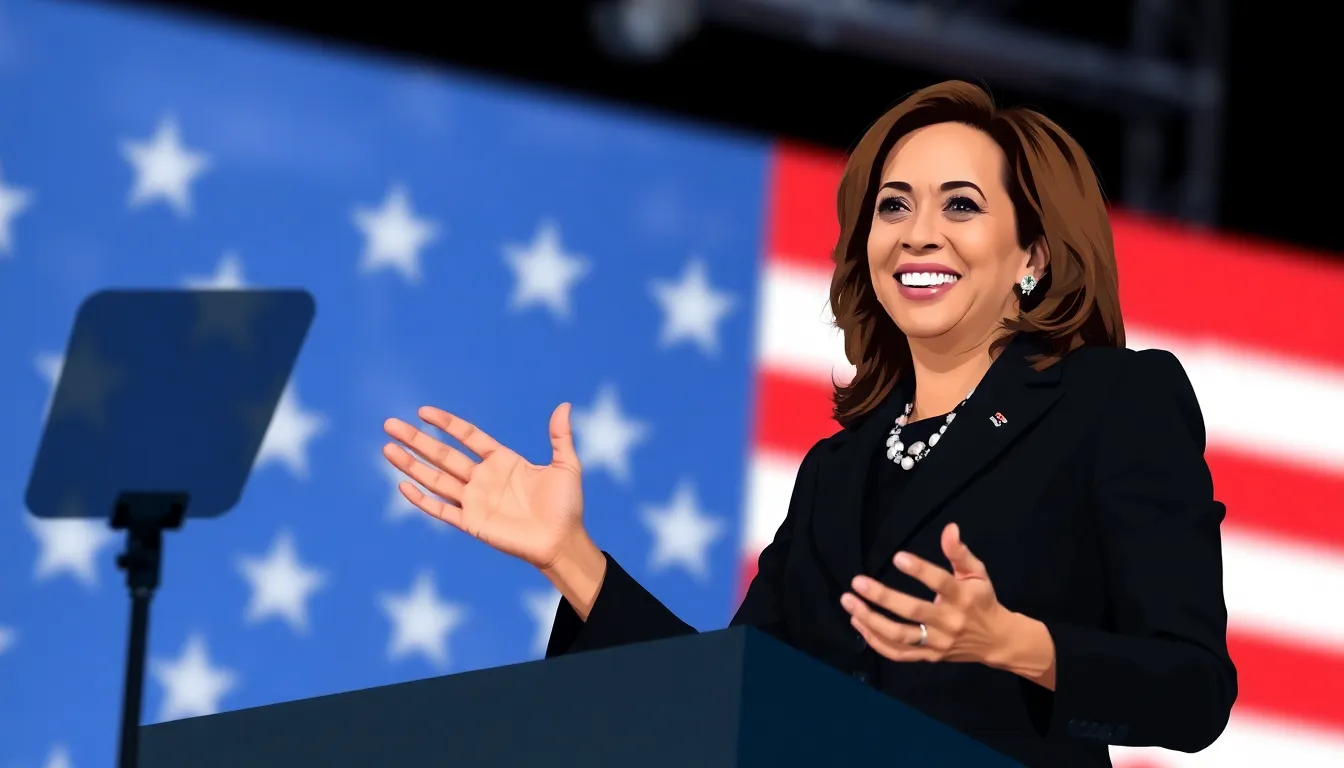Kamala Harris, the first female Vice President of the United States, has made quite a splash in the political pool. But just how many bills has she passed? It’s a question that sparks curiosity, and for good reason. After all, she’s not just a pretty face in a power suit; she’s a seasoned legislator with a track record that deserves a closer look.
Table of Contents
ToggleOverview of Kamala Harris’s Legislative Career
Kamala Harris began her legislative career in the California State Assembly, serving from 2004 to 2011. During her tenure, she championed various issues, focusing on public safety, healthcare access, and environmental justice. Transitioning to the U.S. Senate in 2017, she continued advocating for progressive policies.
Harris introduced numerous bills addressing criminal justice reform, immigration, and women’s rights. Among her notable efforts, the Justice in Policing Act aimed to combat police misconduct and improve accountability. This bill showcased her commitment to addressing systemic issues within law enforcement.
In her time as a senator, Harris co-sponsored key legislation linked to COVID-19 relief, aimed at providing financial support for individuals and businesses. This response aimed to mitigate the pandemic’s impacts on vulnerable populations. Notably, her work on the American Rescue Plan further exemplified her focus on economic recovery.
Despite her significant contributions, metrics quantify her direct legislative achievements. As of October 2023, Harris passed approximately 11 bills as a member of the Senate. Each bill reflects her dedication to addressing the concerns of diverse communities.
Throughout her career, Harris maintained strong connections with advocacy groups and constituents, facilitating dialogue on pressing societal challenges. These engagements highlighted her responsive approach to legislation. The cumulative impact of her efforts shows a commitment to inclusivity and justice in lawmaking.
Key Legislation Sponsored by Kamala Harris

Kamala Harris has sponsored important legislation during her career as a senator. Her focus on progressive issues shapes her legislative contributions.
Significant Bills Passed
Harris successfully passed several bills addressing critical social issues. The Justice in Policing Act aimed to reform police practices and increase accountability. Another notable bill, the Maternal Health and Anti-Discrimination Act, sought to address disparities in maternal healthcare, particularly for women of color. Additionally, she played a role in promoting the Consumer Protection and Recovery Act, which provided essential protections for consumers against unfair practices. The Domestic Violence and Economic Security Act also stands out for its efforts to protect survivors of domestic violence through economic support. Each of these bills highlights her commitment to social justice.
Impact of These Bills
The legislation Harris sponsored has had significant societal implications. By advancing the Justice in Policing Act, she fostered discussions about accountability and systemic reform within law enforcement. Improvements in maternal healthcare were prioritized through the Maternal Health and Anti-Discrimination Act, leading to better outcomes for vulnerable populations. The Consumer Protection and Recovery Act helped safeguard consumers, reflecting a commitment to economic fairness. Harris’s Domestic Violence and Economic Security Act provided critical resources to survivors, thus promoting safety and stability. Collectively, these bills illustrate her influence on legislative progress and commitment to equity.
Challenges Faced in Passing Legislation
Kamala Harris encountered various challenges during her legislative career. The political landscape in Congress often presents obstacles for advancing bills. Partisan divides frequently block progress, complicating bipartisan support for critical legislation. Senators may prioritize party alignment over collaborative efforts, hindering meaningful discussions.
Opposition from special interest groups creates additional hurdles. These entities often lobby against bills that threaten their agendas, influencing lawmakers’ decisions. Advocacy efforts by grassroots organizations sometimes face significant resistance from established political interests. Complexities in navigating these relationships can slow down the legislative process.
Public opinion plays a crucial role in shaping legislative outcomes. Pressure from constituents can drive or derail initiatives based on their concerns. Legislators face urgency to address pressing issues while maintaining support from their voter base. This balance often complicates the timing and scope of proposed legislation.
Harris has also experienced setbacks while introducing progressive measures. The Justice in Policing Act, for example, faced significant pushback despite its popularity among advocates for police reform. Strategies to build coalitions across party lines sometimes proved more challenging than anticipated. Continued advocacy and mobilization efforts from the public helped sustain momentum for important issues.
In addition, the COVID-19 pandemic introduced new complexities to legislation. Rapidly changing circumstances affected the urgency and focus of congressional priorities. While Harris co-sponsored significant relief efforts, navigating the evolving crisis demanded quick adaptations and changes in strategy. These factors collectively illustrate the dynamic challenges faced in passing legislation, each influencing Harris’s ability to champion critical issues effectively.
Analysis of Kamala Harris’s Influence on Policy
Kamala Harris has played a crucial role in shaping policy through her legislative efforts. Her tenure in the California State Assembly laid the groundwork for her focus on critical issues, including public safety and environmental justice. Transitioning to the U.S. Senate in 2017, she introduced a series of impactful bills addressing criminal justice reform, immigration, and women’s rights.
Significant legislation highlights Harris’s commitment to social equity. The Justice in Policing Act serves as a prime example, aiming to enhance accountability in law enforcement. Another notable bill, the Maternal Health and Anti-Discrimination Act, directly targets healthcare disparities affecting women of color. Each bill reflects her approach to addressing systemic issues.
Harris’s co-sponsorship of key COVID-19 relief measures evidences her responsiveness to urgent needs. The American Rescue Plan illustrates her dedication to providing critical support for individuals and businesses affected by the pandemic. Passing 11 bills as of October 2023 underscores her legislative effectiveness.
Challenges often arise in the legislative process. Partisan divides in Congress complicate efforts to gain bipartisan support, particularly for contentious issues like police reform. An ongoing struggle involves combatting opposition from special interest groups and navigating fluctuating public opinion.
Despite obstacles, Harris remains resilient in her mission. Building coalitions proves essential for advancing controversial policies. Adapting strategies in response to the evolving landscape, especially during the COVID-19 pandemic, showcases her capacity for advocacy. Overall, Harris’s influence on policy reflects her commitment to inclusivity and her dedication to addressing concerns within diverse communities.
Kamala Harris’s legislative career showcases her commitment to social justice and equity. With approximately 11 bills passed in the Senate, she has made significant strides in areas like criminal justice reform and healthcare access. Her ability to navigate complex political landscapes demonstrates her resilience and dedication to addressing the needs of diverse communities.
Despite facing challenges such as partisan divides and opposition, Harris continues to advocate for progressive policies. Her efforts reflect not only her legislative achievements but also her unwavering commitment to inclusivity and justice. As she moves forward in her role, her influence on policy will likely continue to shape critical discussions and drive meaningful change.








